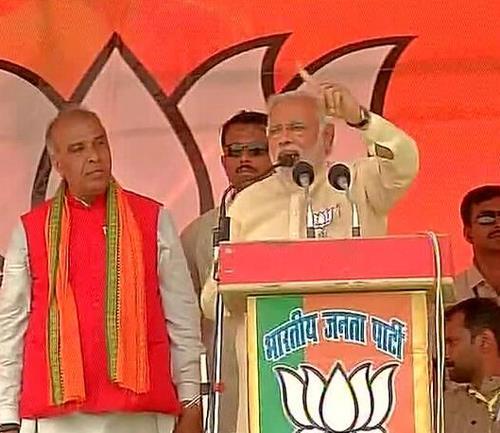cgqtu lekt ikVhZ] dsUnzh; dk;kZy; }kjk tkjh izsl foKfIr
ns'k esa **loZtu fgrk; o loZtu lq[kk;** dh ljdkj cukus gsrq ch-,l-ih- dh jk"Vªh; v/;{k] lkaln ¼jkT;lHkk½ o mÙkj izns'k dh pkj ckj jgha eq[;ea=h lqJh ek;korh th dk] ch-,l-ih- mEehn~okjksa ds leFkZu esa] l?ku pqukoh vfHk;ku ds rgr~ dy fnukad 07 ebZ] 2014 dks mÙkj izns'k dk pqukoh nkSjk yxkrkj tkjh
y[kuÅ] 06 ebZ] 2014 % ch-,l-ih- dh jk"Vªh; v/;{k] lkaln ¼jkT;lHkk½ o mÙkj izns'k dh pkj ckj jgha eq[;ea=h lqJh ek;korh th] ns'k esa 16oha yksdlHkk ds fy;s gks jgs vkepquko gsrq viuh ikVhZ ds mEehn~okjksa ds leFkZu esa l?ku pqukoh vfHk;ku ds rgr~ dy fnukad 07 ebZ] lu~ 2014 dks iwokZapy ds cfy;k o tkSuiqj ftys esa 2 ¼nks½ pqukoh tulHkkvksa dks lEcksf/kr djsaxhA
lqJh ek;korh th mÙkj izns'k ds vius pqukoh nkSjs esa dy fnukad 07 ebZ] 2014 fnu cq/kokj dks igyh tulHkk cfy;k ftys ds Vkmu ikyhVsfDud eSnku esa o nwljh tulHkk tkSuiqj ftys ds ohjcgknqj flag iwokZapy egkfo|ky; eSnku esa lEcksf/kr djsaxhA
tSlkfd loZfofnr gS fd vius ns'k esa lkekftd ifjorZu dh egkukf;dk vk;juysMh lqJh ek;korh th us ns'k esa 16oha yksdlHkk ds fy;s gks jgs vkepquko gsrq viuh ikVhZ ds jk"Vªh; vfHk;ku dh] fnukad 22 ekpZ dks >kj[k.M jkT; dh jkt/kkuh jk¡ph esa pqukoh tulHkk dks lEcksf/kr dj 'kq:vkr dh Fkh vkSj bl Øe esa os vksfMlk] gfj;k.kk] egkjk"Vª] fcgkj] p.Mhx<+] if'pe caxky] tEew&d'ehj] e/; izns'k] fnYyh] jktLFkku] vkU/kz izns'k] NÙkhlx<+] iatkc o mÙkjk[k.M jkT; esa vusdksa pqukoh tulHkkvksa dks lEcksf/kr dj pqdh gSa vkSj vc bl ekg fnukad 09 ebZ dks izpkj vfHk;ku dh lekfIr rd mudk yxHkx iwjk le; mÙkj izns'k esa gh ikVhZ ds pquko vfHk;ku ds fy;s yx jgk gSA lqJh ek;korh th mÙkj izns'k esa vc rd ft+yk fctukSj] vyhx<] eqt+¶Qjuxj] lgkjuiqj] cqyUn'kgj] x+kft+;kckn] esjB] ckxir] 'kkeyh] y[kheiqj [khjh] gjnksbZ] cjsyh] 'kkgtgk¡iqj] eqjknkckn] vejksgk] dkuiqj] vkSjS;k] fQjkstkckn] eFkqjk] vkxjk] Q:Z[kkckn] eSuiqjh] lhrkiqj] ckjkcadh] ckank] egksck] >kalh] tkykSu] Qrsgiqj] mUuko] lqYrkuiqj] izrkix<+] QStkckn] xks.Mk] cLrh] y[kuÅ] lar jfonkl uxj Hknksgh] bykgkckn] cyjkeiqj o JkoLrh] vEcsMdjuxj] cgjkbp] eÅ] vktex<+] xksj[kiqj o dq'khuxj ftys esa cM+h pqukoh tulHkkvksa dks lEcksf/kr dj pqdh gSaA
vkt fnukad 06 ebZ dks lqJh ek;korh th }kjk igyh tulHkk nsofj;k ftys esa fLFkr jktdh; b.Vj dkyst ifjlj esa rFkk nwljh tulHkk dq'khuxj ftys dh ykyxat lqjf{kr yksdlHkk lhV ds fy, vktex<+ ftys ds xzke [kjsoka ljka;ehj] eSnku esa lEcksf/kr djus dk dk;ZØe gSA
tkjhdrkZ %
ch-,l-ih- dsUnzh; ;wfuV
4] xq:}kjk jdkcxat jksM]
ubZ fnYyh & 110001






